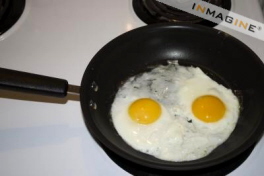October 28, 2009, - 4:19 pm
Scientific Study: This Is Your Brain Without Dad
Reader Sorrow01 sent along this great LiveScience article about how we are one of the few species of mammal in which the father has interaction with his offspring after they are born. Yes, fathers make us human. But, sadly, it’s a long-term trend I’ve written about here over the years that almost half of U.S. children are not only born out of wedlock but have absolutely no father figure in their lives.


This Is Your Brain Without A Dad. Any Questions?
Unlike many other animals, humans need their fathers well beyond the act that leads to conception, researchers are coming to realize.
Now, there’s yet another study–this one scientific–that shows fathers do matter and that, without them in a child’s life, a kid is likely to have many behavioral problems. Previous studies were behavioral studies on humans. But this latest study deals with the brains and behavioral activity of rodents. It’s interesting. And it shows that feminists and the single motherhood they’ve pushed on America create serious defects, proven by science. It shows the deleterious physical effects an absent father has . . . ultimately on our society. And Sarah Palin’s grandson–even if his father is as dysfunctional as the rest of the Palin family–is no exception. They’re part of the problem, NOT the solution.
“This is Your Brain Without Dad” details the results of the study:
Conventional wisdom holds that two parents are better than one. Scientists are now finding that growing up without a father actually changes the way your brain develops.
German biologist Anna Katharina Braun and others are conducting research on animals that are typically raised by two parents, in the hopes of better understanding the impact on humans of being raised by a single parent. Dr. Braun’s work focuses on degus, small rodents related to guinea pigs and chinchillas, because mother and father degus naturally raise their babies together.
When deprived of their father, the degu pups exhibit both short- and long-term changes in nerve-cell growth in different regions of the brain.
Dr. Braun, director of the Institute of Biology at Otto von Guericke University in Magdeburg, and her colleagues are also looking at how these physical changes affect offspring behavior.
Their preliminary analysis indicates that fatherless degu pups exhibit more aggressive and impulsive behavior than pups raised by two parents.
In a study the researchers presented at the Society for Neuroscience meeting in Chicago earlier this month and recently published in the journal Neuroscience, half the degus were raised with two parents, while the others were raised by a single mother, the father having been removed from the cage one day after the birth of his offspring. . . .
When the mother was a single parent, . . . those pups experienced significantly less touching and interaction than those with two parents.
The researchers then looked at the neurons—cells that send and receive messages between the brain and the body—of some pups at day 21, around the time they were weaned from their mothers, and others at day 90, which is considered adulthood for the species.
Neurons have branches, known as dendrites, that conduct electrical signals received from other nerve cells to the body, or trunk, of the neuron. The leaves of the dendrites are protrusions called dendritic spines that receive messages and serve as the contact between neurons.
Dr. Braun’s group found that at 21 days, the fatherless animals had less dense dendritic spines compared to animals raised by both parents, though they “caught up” by day 90. However, the length of some types of dendrites was significantly shorter in some parts of the brain, even in adulthood, in fatherless animals.
“It just shows that parents are leaving footprints on the brain of their kids,” says Dr. Braun, 54 years old.
The neuronal differences were observed in a part of the brain called the amygdala, which is related to emotional responses and fear, and the orbitofrontal cortex, or OFC, the brain’s decision-making center. . . .
A preliminary analysis of the degus’ behavior showed that fatherless animals seemed to have a lack of impulse control, Dr. Braun says. And, when they played with siblings, they engaged in more play-fighting or aggressive behavior. . . .
Other researchers, such as Xia Zhang, a senior scientist at the University of Ottawa Institute of Mental Health Research, and his colleagues in China, have observed different consequences using voles, mouselike rodents that also naturally co-parent. (Fewer than 10% of species raise their offspring with two parents.)
Voles deprived of their fathers—either from birth or later on in childhood—exhibited more anxious behaviors and were less social . . . .
Sadly, scientists tend to be wimps when it comes to stating that their studies and scientific data show that liberal social constructs don’t work. That’s the case here, too.
It remains an “open verdict” whether single parenthood causes these bad outcomes, or is merely associated with them, says Dr. Chapple.
Still, the prevalence of single-parent households has researchers looking at possible consequences for children.
Glad they finally discovered America.
Dr. Braun’s goal for future research is to figure out whether degu pups’ brains can be rewired by introducing a substitute caregiver, such as a grandmother, or whether other social and emotional enrichment can help “repair” the fatherless pups, she says.
Good luck with that. There is no substitute for a father.
Tags: Anna Katharina Braun, baby mamas, babymamas, brains, Bristol Palin, dads, degus, fatherhood, fathers, guinea pigs, Kathleen McAvoy, nerve-cellgrowth, Otton Von Guericke University of Magdeburg, rodents, Sarah Palin, single motherhood, single mothers, Society for Neuroscience, the importance of fathers, this is your brain without dad, voles


I would think a strong MALE figure might work but another female??? Doubt it.
MK750 on October 28, 2009 at 4:50 pm